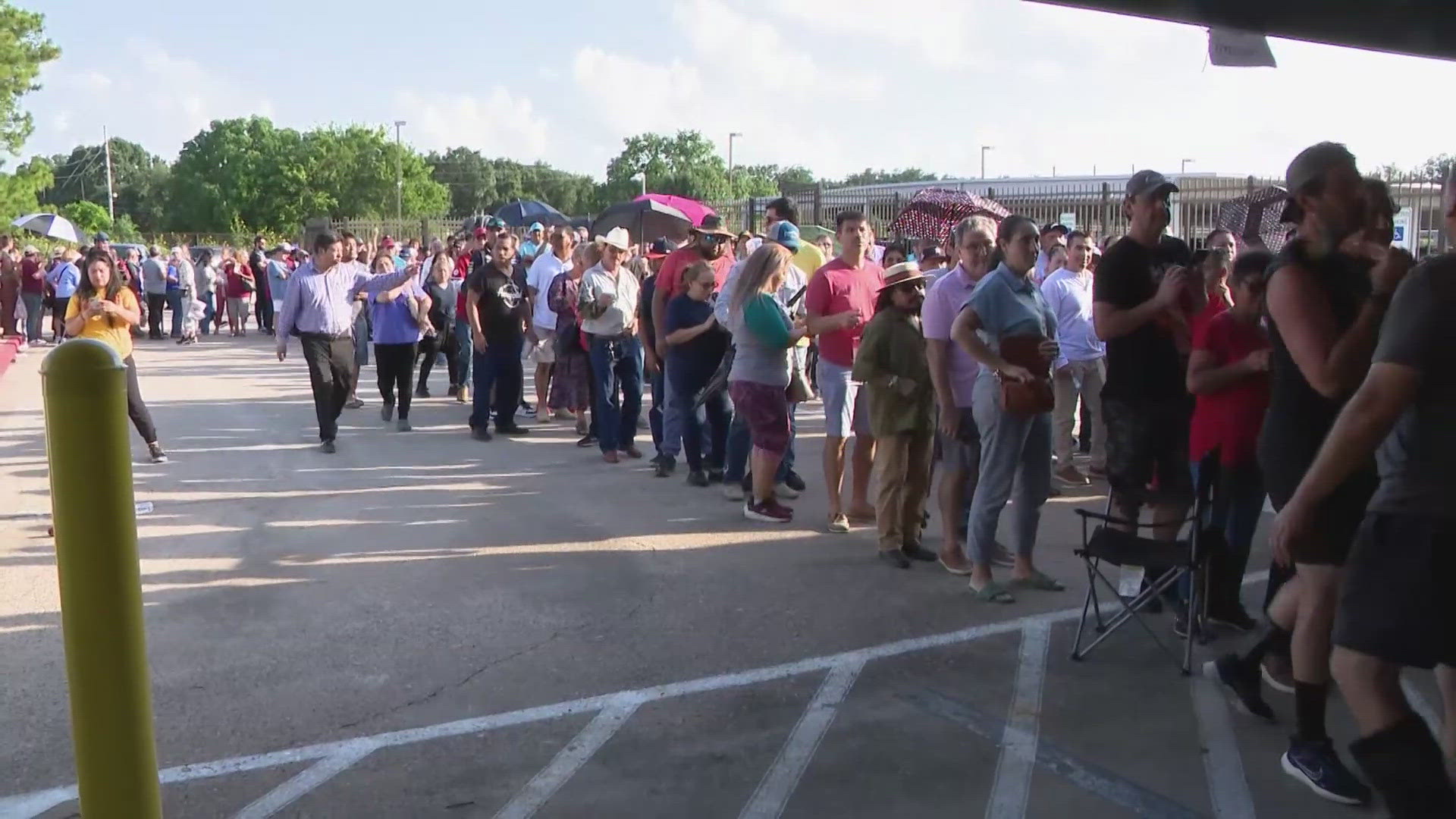HOUSTON — Mexican citizens living in Houston went to the polls Sunday to vote for who will likely be Mexico's first female president, voicing concerns overwhelmingly about security, from the power of Mexico's drug cartels down to street-level stick-ups.
They were choosing between two women, a former academic who promises to continue outgoing President Andrés Manuel López Obrador's populist policies, Claudia Sheinbaum, and an ex-senator and tech entrepreneur who pledges to up the fight against deadly drug cartels, Xóchitl Gálvez. A third, male candidate from a smaller party had focused his attention on the youth vote.
The Mexican Consulate in Houston was one of two polling sites in Texas, the other being in Dallas, that held in-person voting for Mexican nationals living in the U.S.
Voters told KHOU 11 News they started lining up at 5 a.m. Sunday to vote and waited for hours. Polls opened at 9 a.m. and closed at 7 p.m.
Inside the consulate on Richmond Avenue were eight voting machines. Many people said it wasn't enough for the amount of people who showed up.
"I was here all night long," said Maria Elisa Galvan. "I came from The Woodlands, stayed at a hotel to be one of the first in the line."
"Queremos el cambio, queremos tener el derecho al voto," said Alejandra Perales, a woman who came all the way from San Antonio to make her voice heard.
"We want the change, we want the chance to vote," Perales said. She waited over eight hours to vote.
Fortunato Flores made the trip to Houston from Austin.
"The people who want to vote have to drive all they way here," he said.
Those who wanted to vote must have been registered by Feb. 25, 2024, but 1,500 provisional ballots were available for those who had valid voting IDs.
Houston police were even called to control the crowd outside the Mexican Consulate as eager voters called the election "fraudulent" because they'd been waiting for hours.
After the polls closed, people still waiting outside were heard chanting "We want to vote."
The consulate in Houston had just under 3,000 people sign up and 1,500 provisional ballots, but only a little over 1,600 people were able cast their vote.
According to a report from the Wilson's Center Mexican Institute, over 1.3 million Mexican registered voters live abroad. The report also states that the American cities with the highest potential votes are Houston, Chicago, Los Angeles and Dallas.
The elections are widely seen as a referendum on López Obrador, a populist who has expanded social programs but largely failed to reduce cartel violence in Mexico. His Morena party currently holds 23 of the 32 governorships and a simple majority of seats in both houses of Congress. Mexico’s constitution prohibits the president’s reelection.
Both major presidential candidates are women, and either would be Mexico's first female president. The third candidate from a smaller party, Jorge Álvarez Máynez, trailed far behind.
Mexico City Mayor Claudia Sheinbaum is running with the Morena party. Sheinbaum, who leads in the race, has promised to continue all of López Obrador’s policies, including a universal pension for the elderly and a program that pays youths to apprentice.
Opposition presidential candidate Xóchitl Gálvez, whose father was Indigenous Otomi, rose from selling snacks on the street in her poor hometown to start her own tech firms. A candidate running with a coalition of major opposition parties, she left the Senate last year to focus her ire on López Obrador’s decision to avoid confronting the drug cartels through his “hugs not bullets” policy. She has pledged to more aggressively go after criminals.
The persistent cartel violence, along with Mexico's middling economic performance, are the main issues on voters' minds.
López Obrador claims to have reduced historically high homicide levels by 20% since he took office in December 2018. But that's largely a claim based on a questionable reading of statistics; the real homicide rate appears to have declined by only about 4% in six years.
About 675,000 Mexicans living abroad are registered to vote, but in the past only a small percentage have done so. Voting is not mandatory in Mexico, and overall turnout has hovered around 60% in recent elections. That compares to turnout in recent U.S. presidential elections. An exception was in 2020, when the matchup between then-President Donald Trump and future President Joe Biden pushed U.S. voter turnout to 67%, its highest point in decades.

